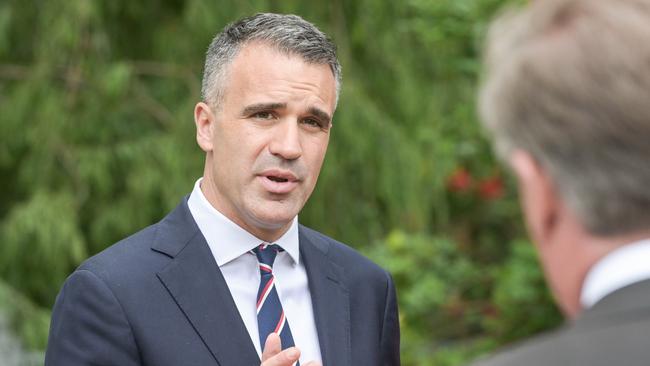Federal budget 2022: Premier Peter Malinauskas labels soaring power costs ‘catastrophic failure’
Brace for a power bill blowout, the Premier has warned, after the federal budget was handed down – but he insists it’s not Labor’s fault.
SA News
Don't miss out on the headlines from SA News. Followed categories will be added to My News.
South Australians could be slugged an extra $1000 on their annual power bill over the next two years, with energy prices predicted to soar by 56 per cent by the end of 2024.
Premier Peter Malinauskas says a task force has been formed to tackle the state’s energy cost crisis in the wake of Tuesday’s federal budget, but stopped short of promising direct support for consumers.
REPLAY THE PRESS CONFERENCE
Federal Treasury estimates retail electricity prices will increase by 20 per cent nationally in 2022-23, with that figure to blow out to 30 per cent by 2023-24.
Speaking on Wednesday morning, Mr Malinauskas blamed the Olsen Liberal government’s 1998 decision to privatise the state’s power supply for the blowout, saying soaring costs had been a “catastrophic policy failure that has been allowed to fester for the better half of a couple of decades”.
The premier remained adamant SA would not face the same price rises as the eastern states, saying the state’s advanced position on renewable energy would help shield consumers – but warned a substantial shock was still on the way.
“The prospect of energy prices going up by over 50 per cent throughout the nation is a function of some poor decisions made in the past,” Mr Malinauskas said.
“I don’t think on any rational or reasonable analysis anyone would agree that Australia should find itself in this position, given our abundance of natural resources when it comes to energy.”
Mr Malinauskas said an energy task force had been formed to tackle the power crisis, with the Department of Energy and Mining working alongside industry experts to bring options to the table in coming weeks.

He said the state government would apply active consideration to further concessions for households, but South Australians would have to “wait and see”.
“We are willing to deploy every tool and power that is at our disposal to ameliorate South Australian households, but also businesses, from the worst of this impact,” he said.
“We don’t want to be rash, but we also appreciate the urgency of confronting this situation.”
According to consumer group Canstar Blue, the average annual electricity bill in South Australia is about $1488 for general energy usage of 4000kWh/year – but that figure can soar above $2000 depending on the energy plan.
A one-person household with an annual bill of $1488 could be slugged an extra $833.28 per year by 2024 if prices rise by a predicted 56 per cent.
A household paying $1718 could be paying an extra $962.08 annually, while a larger household with a bill of $1901 could be paying an extra $1064.56.
Shadow state treasurer Matt Cowdry said the federal budget was a huge blow for South Australian families and slammed the government over rising cost of living pressures.
“Electricity costs are schedule to increase by 50 per cent over the coming years, which flies in stark contrast to the commitment that was given to the people of South Australia by the federal government when in opposition - that electricity prices would drop by $275 under their watch,” Mr Cowdrey said.
“There doesn’t appear to be any cost of living relief in sight for South Australian families off the back of this federal budget.”
Among the $600m hydrogen power plant investment to have a “positive impact” on power prices long term, Mr Cowdrey said that would provide little comfort for struggling families.
Joel Gibson from the consumer network OneBigSwitch said the energy price crisis should now be the government’s top priority if Australia was to avoid similar scenes to the UK, where 40 retailers had gone bust and price caps had doubled.
“The budget was an opportunity to address the biggest cost-of-living crisis we face right now – energy bills – but the government has elected to kick the can down the road,” Mr Gibson said.
“We now need a national summit to deal with this issue. Business as usual won’t cut it. If we don’t ring the bell now, we’ll have millions of Aussies who can’t afford to turn the lights on.”





